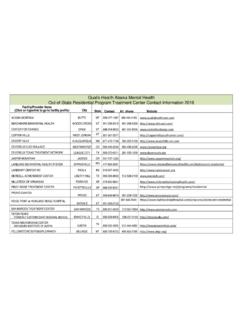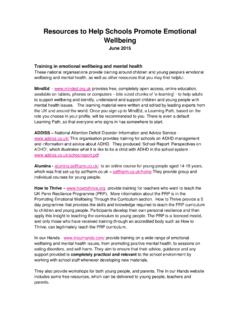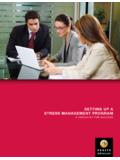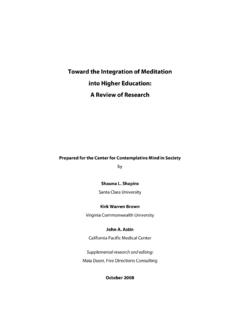Transcription of Wellness and Resilience Program 2011
1 Evaluation of the South Burlington Wellness and Resilience Program Year Three 2011 mindfulness is the awareness that arises from paying attention on purpose, in the present moment, and non-judgmentally. -Jon Kabat-Zinn (Professor of Medicine Emeritus at the University of Massachusetts Medical School, where he was founding executive director of the Center for mindfulness in Medicine, Health Care, and Society, and founder and former director of its world-renowned Stress Reduction Clinic.)
2 CONTENTS Abstract Introduction .. 1 Educator Stress, Burnout and mindfulness Benefits of mindfulness Practice for Teachers Associated Impact on Students The Inner Resilience Program - Nurturing the Inner Life of Teachers and Students The Wellness and Resilience Program (WRP) . 5 Sample and Recruitment Attrition Components of WRP .. 5 Fall Self-Care Retreat Monthly Training in mindfulness Skills mindfulness Practice Day and a Half Spring Retreat Optional Weekly Opportunities in Mind-Body Practices Classroom/School Integration Community Connection Evaluation Methodology .. 6 Measures Findings - Quantitative .. 7 mindfulness Application Survey (MASQ) Perceived Stress Scale (PSS) Mindful Attention Awareness Scale (MAAS) Findings - Qualitative .. 8 WRP Effect on Educators Personal Lives WRP Effect on Educators Professional Lives Perceived Impact on the Students of WRP Participants Educator Recommendation of WRP Discussion.
3 11 Future Considerations Summary and Recommendation References .. 13 2. The detrimental effects of work related stress on the well being and effectiveness of Educators has garnered substantial attention in educational research. Among the efforts to combat Teacher stress and burnout, the use of physiological and psycho-logical contemplative techniques, also known as mindfulness , has attracted growing interest for its potential application in promoting Teacher well-being (Simon et al., 2009). For a third consecutive year, the Wellness and Resilience Program (WRP) was conducted in the South Burlington School District. The mis-sion of WRP sought to improve Educators abilities to cope with their demanding jobs through the utilization of contemplative practices in both their personal and professional lives. The con-tent of the ten-month WRP Program included a series of monthly group meetings, a fall one-day and spring weekend retreat, weekly yoga classes, meditation and deep breathing training, as well as training and support in the use of additional contemplative and stress-reduction practices.
4 A total of 61 teachers/staff from five South Burlington public schools participated during the 2009/2010 school year. Reduction of stress reports from staff, improvement in personal health promotion, and mindful atten-tion awareness were reflected in the changes in pre to post-test scoring for the recorded measures: the Perceived Stress Scale (PSS), the mindfulness Application Survey (MASQ), and the Mindful Attention Awareness Scale (MAAS) respectively. The findings of the evaluation corroborate pre- Program hypotheses predicting data trends supporting the benefit of Wellness and Resilience Program training and practice for Educators. Acknowledgements The development of the Wellness and Resilience Program (WRP) was due in large part to the expertise and efforts of several individuals. Special thanks are due to the WRP Planning Team: Madelyn Nash, Carol Wheeler, Dean Melen, Pat Messerle, Sheri Rand and Auriel Gray.
5 The consultation, mentoring and training provided by Linda Lantieri was likewise invaluable. WRP has been fortunate to benefit from the guidance and facilitation provided by Sonny Casani and Anthony Quintiliani. Additionally, sincere gratitude is extended for the support bestowed by Superintendent John Everitt of South Burlington School District, Marilyn Neagley from Talk About Wellness and Melanie Wilson of the New England Network. Lastly, thank you to Susie Merrick for her tireless coordination of the WRP Community Program . Matthew MacNeil, Director of Evaluation, Howard Center for Human Services Auriel Gray, School Counselor, South Burlington School District Anthony Quintiliani, Program Consultant & Counseling Professor, University of Vermont Introduction The beneficial effects of mindfulness and Contemplative Practices are reflected in a steadily growing body of clinical and educational research.
6 Documented research trends have illuminated the utility of mindfulness techniques in promoting a wide range of improvements to emotional and experiential well being. A recent meta analytic review found that mindfulness based interventions have solidly documented associations with a wide range of indices of psychological health (Hoffman et. al, 2010). Among the demonstrated gains associated with mindfulness practice include studies linking mindfulness based programs with decreased anxiety, improved sleep and physical health, enhanced behavioral self control, promotion of auto immune systems, increased neuro cognitive responsive ness, and heightened empathic awareness (Flasman & Flook, 2009). As the body of evidence supporting the efficacy of mindfulness and Contemplative Practices has expanded, so has the interest in these practices from mainstream school systems and Educators. An increasing cluster of investigators has begun examining the applica tion of mindfulness practices in educational settings.
7 Although there is clearly established research demonstrat ing the role of mindfulness in promotion of well being for adults, there is a relatively limited number of evaluative studies specifically documenting the association of mind fulness and well being for educators. Educator Stress, Burnout and mindfulness The deleterious effects of professional stress on the well being of Teachers are thoroughly documented in educa tional research. Among studies in Industrial/Organizational Psychology, teaching is increasingly ranked among the highest stress inducing professions (Kyriacou, 2001). As many as one quarter of teachers consider their profession to be a highly stressful occupation (Klassen & Chui, 2010). Demands from administrators, students, and parents compounded by work overload, student misbehav ior, conflict with colleagues, and a perceived lack of recog nition for accomplishments all produce risk for disruption to an educator s emotional and professional well being.
8 Teachers experiencing high stress levels have lower self efficacy, poorer teacher pupil rapport, lower effectiveness ratings, and higher rates of burnout related turnover (Klassen & Chui, 2010). An important mitigating factor in the experience of teacher stress is access to formalized professional support systems within his or her education settings. Lui & Ramsey (2008) found that supportive work environ ments had the strongest influence of teachers job satis faction and perception of occupational manageability . Wellness programs for school staff are essential compo nents in creating environments where Educators can feel self efficacy. Gray (2011) points out that in particular, providing non threatening, secular opportunities for staff to learn and practice mind body approaches can go a long way toward nurturing peace in the classroom and school. The simple logic being that, when teachers feel cared for, they are better able to care for their students.
9 mindfulness approaches, embedded in educator professional develop ment provide a means for regularly reminding school staff of their own ability to self regulate. In this way it is empowering and nurtures in them a belief in their personal capacity for self awareness and control (Gray, 2011). Benefits of mindfulness Practice for Teachers Despite the aforementioned paucity of studies targeting specific associations between mindfulness and educator well being, a few examinations have begun to establish some evidence pointing to the existence of a positive correlation relationship. A model for developing social and emotional competence was evaluated by Penn State researchers in 2009. The model included an emphasis on teacher participation in stress reduction and mindfulness development programs . Jennings and Green (2009) proposed that increased involvement in contemplative practices served as a buffer for teachers against burnout and associated job stress.
10 The authors went on to suggest further reaching benefits might have been gained by devel opment of teacher social and emotional competence including improved classroom climate, enhanced teacher student relationships, effective classroom management, and enhanced academic outcomes. Watts (2009) sought to examine the relationship of mind fulness skills to self perceptions of teacher empowerment. Over 1,100 teachers from 23 schools were surveyed for knowledge of mindful awareness and empowerment 3. indicators of professional growth, self efficacy, impact, and autonomy. Results indicated that higher levels of mindful ness competence correlated with overall teacher percep tion of empowerment. The practical application of the study relates to the consideration of empowerment as a preventative factor for teaching related stress. Similar benefits have been demonstrated in studies utiliz ing qualitative evaluation methodology.







